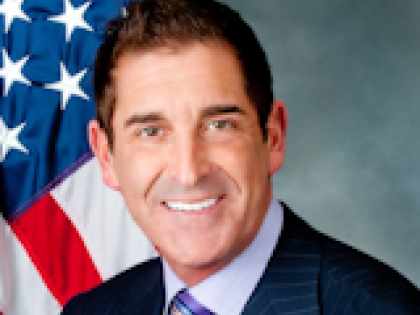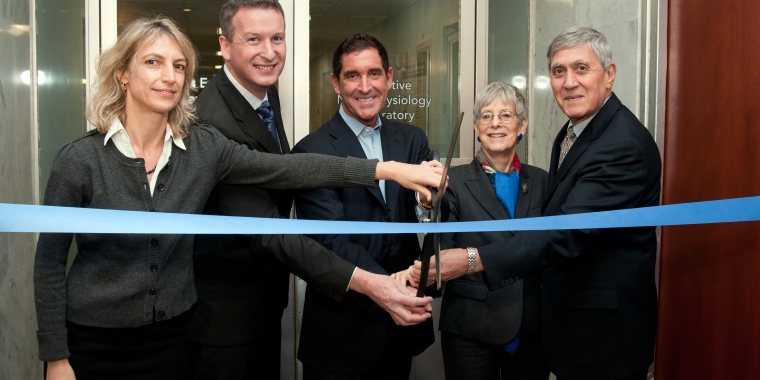
Sen. Klein and Albert Einstein College of Medicine Launch New Cognitive Neurophysiology Lab
Jeffrey D. Klein
November 12, 2011

Construction and Lab Equipment Purchased with $1M Klein Grant
BRONX, N.Y. – Senator Klein joined administrators and faculty members of Albert Einstein College of Medicine of Yeshiva University this morning to officially open their new Cognitive Neurophysiology Laboratory. Several pieces of equipment, including advanced electroencephalogram (EEG) systems, stimulus delivery equipment and specialized video recording devices, were purchased through a $1 million capital grant that Klein secured for Einstein in the 2009-2010 budget cycle.
The mission of the Cognitive Neurophysiology Lab is to understand how the brain function of individuals with disorders such as autism, attention deficit disorder and childhood schizophrenia differs from that of their typically-developing peers. The facility includes a new 5,000-square-foot lab housing specially designed rooms that allow researchers to control sound and other stimuli and the latest tools to monitor the responses of study participants and patients. The ultimate goal of the lab is to use the information collected to advance the field and develop targeted intervention programs.
“There’s still so much we need to learn about these types of brain disorders” said Senator Jeffrey D. Klein. “That’s why I am pleased we were able to secure these needed funds for our outstanding medical institution, Albert Einstein College of Medicine. It’s my hope that the Bronx can continue to lead the way for this type of medical research and innovation and that our residents will be better for it.”
“Once again, Senator Klein has demonstrated his commitment to helping Einstein fulfill its mission as a leader in translational research,” said Allen M. Spiegel, M.D., the Marilyn and Stanley M. Katz Dean of Einstein. “In conjunction with our National Institutes of Health-funded Rose F. Kennedy Intellectual and Developmental Disabilities Research Center, the Cognitive Neurophysiology Lab will contribute to our essential understanding of the brain and ultimately help improve patient care.”
“The construction and outfitting of the Cognitive Neurophysiology Lab was greatly assisted by the New York State capital budget funding secured by Senator Klein,” said John Foxe, Ph.D., director of research at Einstein’s Children's Evaluation and Rehabilitation Center and professor of pediatrics and of neuroscience. “With this support, I was able to return to Einstein to lead an outstanding team of researchers and clinicians searching for the causes of and treatments for intellectual and developmental disabilities.”
The grant was used to construct the lab and adjoining office space for researchers and to buy equipment, including four high-density EEG recording systems; electrically shielded sound attenuated booths made by a local company in the Bronx (International Acoustics Corporation); stimulus delivery equipment; high-resolution eye-tracking systems; direct feed video and infrared cameras; and a projection screen for visual experiments.
The Cognitive Neurophysiology Laboratory also received substantial support from the National Women’s Division of Albert Einstein College of Medicine.
Albert Einstein College of Medicine of Yeshiva University is one of the nation’s premier centers for research, medical education and clinical investigation. During the 2011-2012 academic year, Einstein is home to 724 M.D. students, 248 Ph.D. students, 117 students in the combined M.D./Ph.D. program, and 368 postdoctoral research fellows. The College of Medicine has 2,522 full time faculty members located on the main campus and at its clinical affiliates. In 2010, Einstein received nearly $200 million in support from the NIH. This includes the funding of major research centers at Einstein in diabetes, cancer, liver disease, and AIDS. Other areas where the College of Medicine is concentrating its efforts include developmental brain research, neuroscience, cardiac disease, and initiatives to reduce and eliminate ethnic and racial health disparities. Through its extensive affiliation network involving five medical centers in the Bronx, Manhattan and Long Island – which includes Montefiore Medical Center, The University Hospital and Academic Medical Center for Einstein – the College of Medicine runs one of the largest post-graduate medical training programs in the United States, offering approximately 150 residency programs to more than 2,500 physicians in training. For more information, please visit www.einstein.yu.edu.
